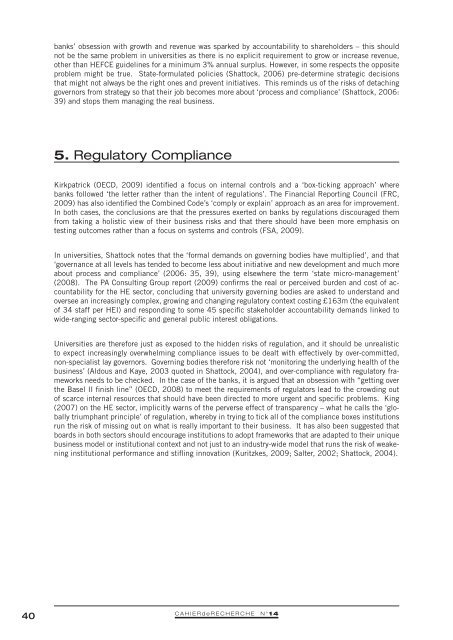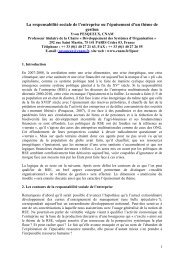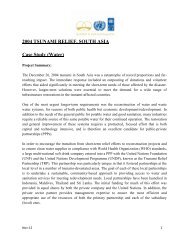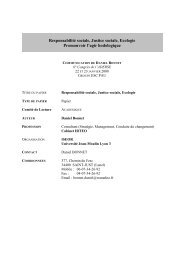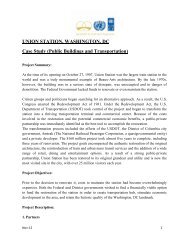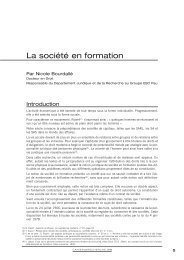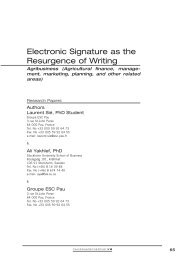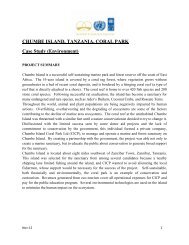3. Scenario PlanningUncertainty is ‘a basic structural feature of the business environment’ (Wack 1985, quoted in Van <strong>de</strong>rHeij<strong>de</strong>n et al, 2002). Just as everyday business matters need to be clearly un<strong>de</strong>rstood and overseeneffectively by governing body members, it is equally important that corporate governance goes beyond ashort-term focus on performance and has a vision that makes long-term health the top objective (Bennett,2002). Banks that successfully managed risk exposures did so thanks to more adaptive processes andsystems and a wi<strong>de</strong> use of scenario analysis. However, in times of prosperity it was sometimes difficultfor the banks’ governing bodies to persua<strong>de</strong> senior management to adopt a ‘forward looking’ approach orboards themselves were unable to see any further than current issues (OECD, 2009). The basic inabilityof boards to be heard or to adopt an enhanced perception of their business by going beyond a reactiverationalistic approach to <strong>de</strong>cision-making is a clear corporate governance weakness.If downsi<strong>de</strong> scenarios are to be built into strategies, a balance of outsi<strong>de</strong> and insi<strong>de</strong> views will be required.Since scenario planning <strong>de</strong>cisions and actions are the results of group processes rather than theindividual thinker (Van <strong>de</strong>r Heij<strong>de</strong>n et al, 2002: 140), university shared governance systems potentiallyoffer the advantage of being able to provi<strong>de</strong> that expert external point of view from within. In a ‘futurethat is going to require continuous adaptation’ (Dearlove, 2002), universities should therefore give particularregard to this aspect of their governance and to organisational learning (Shattock, 2002), since‘Good governance is <strong>de</strong>pen<strong>de</strong>nt on continuous reinvention’ (Baird, 2007). In<strong>de</strong>ed banks have <strong>de</strong>monstratedthat the inability to proactively consi<strong>de</strong>r change and to integrate uncertainty into the business mo<strong>de</strong>lcan be fatal to an organisation.4. Ambitious Business mo<strong>de</strong>lsSome of the major pressures and <strong>de</strong>mands on today’s universities inclu<strong>de</strong> reduced funding, doing morewith less, and the struggle to enhance income through a process of entrepreneurialization (Dearlove,2002). The increasing government-orchestrated <strong>de</strong>mands on universities (Shattock, 2002; 2006) to berun as corporate organisations, means they are as likely to be exposed to the risks posed by governingbodies’ inability to i<strong>de</strong>ntify or question the over ambitious business mo<strong>de</strong>ls that contributed to the currentdifficulties faced by banks.In banks ‘Revenue growth and catching up to competitors was the dominant culture’ (OECD 2008). AtUBS, there was a ‘growth at any cost’ and ‘me too’ mentality sparked by an external consultant appointedto recommend strategy leading to approvals being pushed through without being subjected to ‘substantiveand holistic risk assessment’ (UBS, 2008), which is a corporate governance responsibility accordingto the Combined Co<strong>de</strong>.The ‘brave new world of university inequality’ (Shattock, 2002) where universities are reluctant to ‘tailortheir ambitions to their capacities’ (Salter, 2002) puts pressure on universities to take risks to look forgrowth and revenue in a league table culture context, ‘increasingly concerned with meeting the shortterm,and overwhelmingly economic, needs of the market and ensuring their own financial survival’ (SenateEmployment Workplace Relations Small Business and Education Committee, 2001: 14, quoted inKnight, 2002).Ensuring fitness for purpose and guaranteeing sustainability are roles of corporate governance, requiringa long-term holistic vision that prevents short-term issues getting in the way of the bigger picture. TheCAHIER<strong>de</strong>RECHERCHE N°1439
anks’ obsession with growth and revenue was sparked by accountability to sharehol<strong>de</strong>rs – this shouldnot be the same problem in universities as there is no explicit requirement to grow or increase revenue,other than HEFCE gui<strong>de</strong>lines for a minimum 3% annual surplus. However, in some respects the oppositeproblem might be true. State-formulated policies (Shattock, 2006) pre-<strong>de</strong>termine strategic <strong>de</strong>cisionsthat might not always be the right ones and prevent initiatives. This reminds us of the risks of <strong>de</strong>tachinggovernors from strategy so that their job becomes more about ‘process and compliance’ (Shattock, 2006:39) and stops them managing the real business.5. Regulatory ComplianceKirkpatrick (OECD, 2009) i<strong>de</strong>ntified a focus on internal controls and a ‘box-ticking approach’ wherebanks followed ‘the letter rather than the intent of regulations’. The Financial Reporting Council (FRC,2009) has also i<strong>de</strong>ntified the Combined Co<strong>de</strong>’s ‘comply or explain’ approach as an area for improvement.In both cases, the conclusions are that the pressures exerted on banks by regulations discouraged themfrom taking a holistic view of their business risks and that there should have been more emphasis ontesting outcomes rather than a focus on systems and controls (FSA, 2009).In universities, Shattock notes that the ‘formal <strong>de</strong>mands on governing bodies have multiplied’, and that‘governance at all levels has ten<strong>de</strong>d to become less about initiative and new <strong>de</strong>velopment and much moreabout process and compliance’ (2006: 35, 39), using elsewhere the term ‘state micro-management’(2008). The PA Consulting Group report (2009) confirms the real or perceived bur<strong>de</strong>n and cost of accountabilityfor the HE sector, concluding that university governing bodies are asked to un<strong>de</strong>rstand andoversee an increasingly complex, growing and changing regulatory context costing £163m (the equivalentof 34 staff per HEI) and responding to some 45 specific stakehol<strong>de</strong>r accountability <strong>de</strong>mands linked towi<strong>de</strong>-ranging sector-specific and general public interest obligations.Universities are therefore just as exposed to the hid<strong>de</strong>n risks of regulation, and it should be unrealisticto expect increasingly overwhelming compliance issues to be <strong>de</strong>alt with effectively by over-committed,non-specialist lay governors. Governing bodies therefore risk not ‘monitoring the un<strong>de</strong>rlying health of thebusiness’ (Aldous and Kaye, 2003 quoted in Shattock, 2004), and over-compliance with regulatory frameworksneeds to be checked. In the case of the banks, it is argued that an obsession with “getting overthe Basel II finish line” (OECD, 2008) to meet the requirements of regulators lead to the crowding outof scarce internal resources that should have been directed to more urgent and specific problems. King(2007) on the HE sector, implicitly warns of the perverse effect of transparency – what he calls the ‘globallytriumphant principle’ of regulation, whereby in trying to tick all of the compliance boxes institutionsrun the risk of missing out on what is really important to their business. It has also been suggested thatboards in both sectors should encourage institutions to adopt frameworks that are adapted to their uniquebusiness mo<strong>de</strong>l or institutional context and not just to an industry-wi<strong>de</strong> mo<strong>de</strong>l that runs the risk of weakeninginstitutional performance and stifling innovation (Kuritzkes, 2009; Salter, 2002; Shattock, 2004).40CAHIER<strong>de</strong>RECHERCHE N°14
- Page 1 and 2: CAHIERdeRECHERCHE N°14Institut de
- Page 4: SommaireComment classer les actionn
- Page 7 and 8: RésuméA l’origine, la théorie
- Page 9 and 10: influence via un contrôle externe
- Page 12 and 13: La très grande richesse des travau
- Page 14 and 15: a prévalu pendant de nombreuses an
- Page 16 and 17: Lorsque l’actionnariat a majorita
- Page 18 and 19: ConclusionAinsi, il existe différe
- Page 20 and 21: Huynh, Q. T. (2009), L’influence
- Page 22 and 23: Intrinsic Motivation,Tacit Knowledg
- Page 24 and 25: IntroductionAlthough the importance
- Page 26 and 27: to direct the ability to balance th
- Page 28 and 29: The empirical material is elicited
- Page 30 and 31: on after I am gone. It is of no use
- Page 32 and 33: ReferencesAnderson JR (1982), “Ac
- Page 34 and 35: CAHIERdeRECHERCHE N°1433
- Page 36 and 37: University Corporate Governancein t
- Page 38 and 39: of expertise, workload, unpaid time
- Page 42 and 43: 6. Risk GovernanceRisk governance i
- Page 44 and 45: ReferencesBaird, J. (2007) ‘Takin
- Page 46 and 47: CAHIERdeRECHERCHE N°1445
- Page 48 and 49: Une analyse de la gestionde la perf
- Page 50 and 51: I. Les outils de gestion de la perf
- Page 52 and 53: définissant les finalités des act
- Page 54 and 55: Pour trois-quarts des collectivité
- Page 56 and 57: Au-delà de leur relative nouveaut
- Page 58 and 59: 2. Une mise en œuvre opérationnel
- Page 60 and 61: Or, une démarche de performance se
- Page 62 and 63: 3. L’adaptation du système local
- Page 64 and 65: esponsabilisation et d’évaluatio
- Page 66 and 67: I. NONAKA, “A dynamic theory of o
- Page 68: PROGRAMME GRANDE ÉCOLE, GRADE MAST


